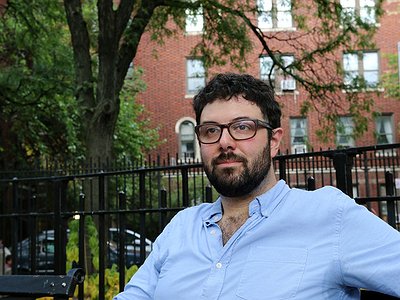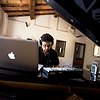Part 2
How do you make use of technology? In terms of the feedback mechanism between technology and creativity, what do humans excel at, what do machines excel at?
A lot of my use of technology is just using it being able to actually hear the sounds! Usually when I can hear the sounds of a piece, I can fix it very easily.
I sample everything, or make assemblages on my computer, and try to hear the pacing as best I can, intuitively. Machines excel at replication, while humans excel at intuition.
Collaborations can take on many forms. What role do they play in your approach and what are your preferred ways of engaging with other creatives, including the artists performing your work?
I’m a very social person, not at all the stereotype of the hermetic composer, and really feel like composing is part of the fabric of my social life. Whether I’m texting fragments of scores to colleagues, having meetings with ensembles as part of the composing process, or getting to know other artists at residencies, communication feels like part of the composition as much as composing itself.
How is writing the music and having it performed live connected? What do you achieve and draw from each experience personally? How do you see the relationship between improvisation and composition in this regard?
When a piece is new it’s terrifying to hear it. I’ve tried to explain to non-composer friends that you basically never hear a piece performed fully prior to the first performance in front of an audience—it’s as if a novelist waited until their book was in print to do a final read-through. So it’s not a fully accurate experience because of all the anxiety. As each subsequent performance happens, the anxiety levels go down, and little by little you become more comfortable with what you’ve created. At some point you let the new piece go and it lives a life of its own
I’m not one for improvisation—it’s not an act I enjoy in it of itself because it always feels like I’m secretly composing, and the second I come up with a good idea, I want to stop and write it down. On the other hand, it would be impossible to compose without some improvisation.
Time is a variable only seldomly discussed within the context of contemporary composition. Can you tell me a bit about your perspective on time in relation to a composition and what role it plays in your work?
I remember an amazing quote from the composer Morton Feldman, “All we composers really have to work with is time and sound—and sometimes I'm not even sure about sound.” That’s kind of how I feel. Feldman and I surely have different aims as composers but the obsession with time, and its close relative, memory, is shared.
When I write music, I’m trying to engage in the remembrance some kind of lost or forgotten aspect of myself. To do this, I have to re-create the experience of remembering within the structure of the piece of music. Therefore repetition and transformation of sound over time are the emotional core of my work.
How do you see the relationship between the 'sound' aspects of music and the 'composition' aspects? How do you work with sound and timbre to meet certain production ideas and in which way can certain sounds already take on compositional qualities?
As I mention above, many of the early influences on my work—Feldman, pre-50s Cage, and Grisey, as well as electronic music like Aphex Twin, are all sound-driven artists.
The objective of my work is the merging pure sound with emotional possibilities. My father is Italian and my mother is Italian-American, and all the stereotypes are true: we’re emotive people!
I recall hearing Alvin Lucier’s "In Memoriam Jon Higgins" for clarinet and sine waves, and finding the physical phenomenon of these two sounds interacting and interfering an intensely powerful physical phenomenon. I wondered what would happen if I mixed the “objective” material in those works with the kind of harmonies that would suggest emotional catharsis.
Our sense of hearing shares intriguing connections to other senses. From your experience, what are some of the most inspiring overlaps between different senses - and what do they tell us about the way our senses work? What happens to sound at its outermost borders?
My music is overwhelmingly referential—I just found a review of a concert of my work that notes I “made references to Thomas Pynchon, a Brooklyn subway stop, the Italian countryside, an interactive sculpture, the lights of Los Angeles, Jorge Luis Borges’ views on nightmares and a poet named Bill Knott.”
When I write music, it’s often diaristic—it’s a reflection of whatever is around me, so the ability to connect music with words and sights is key to extending the power of sound.
Art can be a purpose in its own right, but it can also directly feed back into everyday life, take on a social and political role and lead to more engagement. Can you describe your approach to art and being an artist?
The answer is that I am neither reactive nor nonreactive. I would hate to write music that engages with such a fundamentally uninteresting person as Donald Trump. And yet the world that has formed around him strikes me as an even more extreme version of the world we were in before: It's divided, kinetic, distracted, anxious.
In turn, I want to make something that is frail, exposed, emotional, empathic. Art can act as an enhancing of the senses—I want to enhance the things that make us more empathic, deeper-feeling humans.
I turn to the poet Tom Wayman:
“Weak things have power. … Only the truly weak are free of the temptation to dominate, to harm. That is why democracy is about weakness, why it is to the weak we turn for help when we are beaten, condemned. This is why poems continue like the air.”
It is remarkable, in a way, that we have arrived in the 21st century with the basic concept of music still intact. Do you have a vision of music, an idea of what music could be beyond its current form?
I love this Susan McClary article about imagining a time traveler coming from 100 years ago to find that most music being made is based on cyclical repetition, and how strange it would be to them. So I’m not so sure that’s entirely true.
Also, we historically have the notion of music as a public experience—the symphony, the opera, a chorus, a singalong, whatever—that has been almost entirely replaced by curated, headphone-driven experiences. With streaming music the ability to envelop yourself in a curated experience is very different than what Beethoven was hoping to achieve—a public and communal Ode to Joy. Which is not at necessarily a bad thing.
Yuval Sharon’s production of my opera, "Invisible Cities", surely reflected that tension between live and private experience, and I found myself very moved by watching a group of people listening to my music on headphones in public. The thing that remains intact to me might be the notion of music, private or public, as the emotional core of our lives. Like all kinds of great art, it enhances our emotional vocabulary of how to understand the world.






